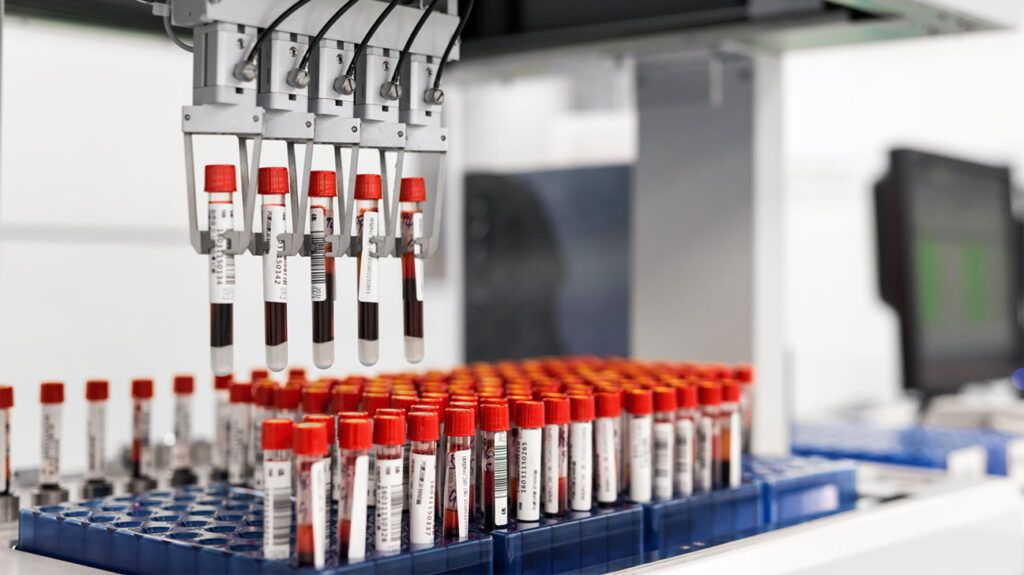
- Multiple sclerosis (MS) is a neurological disorder that affects almost three times as many women as men.
- Currently, an MS diagnosis relies on a range of tests carried out once symptoms are evident.
- Now, a study has found that people diagnosed with MS produce a distinctive set of antibodies many years before symptoms develop
- These antibodies can be detected in the blood, so could potentially lead to a simpler, earlier blood test for MS.
A new study from the University of California, San Francisco, has potentially found a method for easier earlier diagnosis of multiple sclerosis (MS). The researchers detected a distinctive set of antibodies in the blood of people who went on to develop MS that are not found in people without the disease.
Caitlin Astbury, research communications manager at the MS Society, in the United Kingdom, welcomed the findings, who was not involved in the study, telling Medical News Today:
“We’re excited to see these results, which could one day lead to earlier diagnosis of MS for some people. Living with MS can be debilitating, exhausting, and unpredictable.“
“Evidence tells us early treatment is beneficial. In the future, if neurologists are able to diagnose MS earlier people could start treatment sooner,” she added.
The study is published in
These symptoms, which usually start between the ages of 20 and 40 years, may include:
- Muscle weakness and mobility problems.
- Numbness and tingling in the face, body and limbs.
- Bladder and bowel problems.
- Severe fatigue.
- Muscle spasms and tremor.
- Vision problems.
- Emotional changes.
MS is an
Diagnosis depends on
The researchers of this study identified 250 people who had developed MS from more than 10 million United States service personnel. They then retrieved serum results from the Department of Defense Serum Repository for when they entered active duty, 5 years (on average) before their first clinical symptom and 1 year after their first MS attack.
They matched these participants for age, sex, race/ethnicity, and year of serum collection with 250 controls who did not have a diagnosis of MS.
The researchers validated the serum results against serum and
They carried out molecular profiling of autoantibodies and neuronal damage in samples from the 500 participants, measuring serum neurofilament light chain measurement (sNfL) to detect damage to nerve cells.
In those who subsequently received an MS diagnosis, levels of sNfL were higher than the control subjects many years before their first flare-up of symptoms, indicating that damage to nerve cells begins a long time before symptom onset.
The researchers tested the antibody patterns of both MS and control participants using
They found that many of those who went on to develop MS had a distinct pattern of autoantibodies, which they termed an ‘immunogenic cluster’ (IC) that remained stable over time — and this was similar to patterns found in the ORIGINS cohort. This ‘autoantibody signature’ was not seen in controls.
The researchers state that their work: “validates and adds to prior evidence of neuro-axonal injury occurring in patients during the MS preclinical phase.”
“It is an interesting finding that a subset of MS patients have an antibody signature to specific proteins and that the authors could validate the finding in a separate population. Could this be a distinct entity as we have seen for
neuromyelitis optica , which was first considered a severe MS variant and later found to be an own disease based on specific autoantibodies? This will require further confirmation.”— Marianna Cortese, MD, PhD, senior research scientist, Department of Nutrition, Harvard T.H. Chan School of Public Health, Boston, who was not involved in the study.
The authors of the study suggest that the autoantibody signature they detected may have clinical potential for early diagnosis of MS, stating that:
“Given its specificity for MS both before and after diagnosis, an autoantibody serology test against the MSIC peptides could be implemented in a surveillance setting for patients with high probability of developing MS, or crucially at a first clinically isolated neurologic episode.”
Cortese added that the autoantibody signature might have other uses:
“It would also be interesting to see whether these antibodies could be a marker of disease severity and explain some of the MS course heterogeneity.”
Although early diagnosis could help many people avoid the more severe symptoms of MS, Astbury told MNT, this is not the only priority for people with the condition.
“[T]his won’t help a lot of people with progressive MS who have very limited, or no, treatment options. We urgently need to find new treatments so that everyone living with MS can benefit from early diagnosis,” she said.
